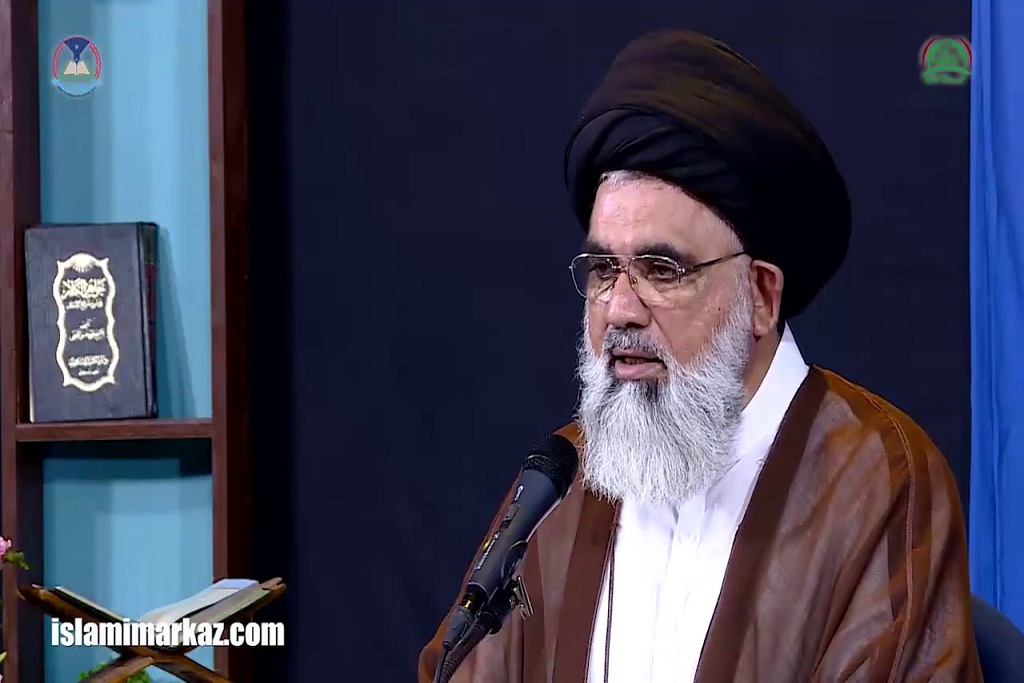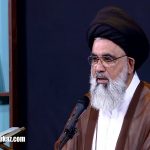Hujjatul Islam Ustad Syed Jawad Naqvi
(Principal Jamia Orwatul Wuthqa – Lahore)
Delivered at: Masjid Baitul ul Ateeq
Lahore – Pakistan
Friday Sermon – 3rd January 2025
Sermon 1: Dynamism in life, society and Quran
Sermon 2: Rajab an opportunity to accelerate
Imam Khomeini (r.a) had a profound understanding of religion that few others have matched. Many people tend to focus on specific aspects of religion, believing that these represent the entirety of their faith. Likewise, the concept of Taqwa, which serves as a protective mechanism, has often been misunderstood, leading to its neglect. Many have translated Taqwa simply as fear, but how can Taqwa be equated with fear? Fear is involuntary and compelling, whereas Taqwa is a conscious choice. When the Quran instructs us to acquire Taqwa, it is not asking us to cultivate fear. While fear may arise spontaneously in our hearts, Taqwa is a deliberate commitment, akin to a security strategy, and such strategies are established through our own will and decision-making.
Moreover, guidance unfolds in stages, and Taqwa similarly exists in stages, beginning with what can be termed fundamental or constitutional Taqwa. In this context, Allah (swt) mentions in Surah Al-An’am, verse 155:
وَهَٰذَا كِتَابٌ أَنْزَلْنَاهُ مُبَارَكٌ فَاتَّبِعُوهُ وَاتَّقُوا لَعَلَّكُمْ تُرْحَمُونَ {155}
[And this is a Book We have revealed, blessed; therefore follow it and guard (against evil) that mercy may be shown to you.
This text discusses the Quran as a comprehensive guide, presenting it as a compiled constitution. The Quran was not originally revealed in written form; instead, it was imparted as divine knowledge to the Prophet Muhammad (s) and later transcribed into words. This process allowed the Quran to become accessible and understandable to human intellect. The Quran is described as ‘Mubarak,’ meaning that life is built upon its foundation, which is expansive and relevant to every generation. It serves as the guiding framework for all aspects of human life, both in this world and the hereafter, and possesses the capacity to support humanity through all ages.
The text emphasizes the imperative to follow (Itteba) the Quran. The term “Itteba” is frequently used in the Quran and holds particular significance in this context. It derives from “Tab’a,” which refers to a baby camel that follows its mother closely without interruption. Unlike the offspring of other animals, a baby camel remains closely bonded to its mother for a considerable time. The essence of “Itteba” is to follow something that is dynamic and in motion. Unlike a static object, such as a pillar, which cannot be followed, true following requires movement.
The distinction between Itteba and Ita’at is also highlighted. While Ita’at refers to obeying divine commands willingly and with pleasure, Itteba signifies active following. For example, if someone performs their prayers out of genuine desire, it reflects Ita’at; conversely, if they are compelled to pray, it does not reflect true obedience.
The concept of movement is essential in understanding humanity, as humans were created to be dynamic beings, governed by the laws of motion. Just as the universe operates under these laws, so too must human life be guided by a dynamic system. Thus, the Quran, as a living constitution, must also be approached with an active mindset.
Life itself is characterized by movement; we are always following someone or something. Our beliefs, behaviors, and values reveal whom we follow, whether it be external influences like political leaders or internal ones like family. This dynamic nature of humanity necessitates guidance, and the Quran serves as the primary guide.
The text also draws a comparison between Ita’at and Itteba, explaining that obedience requires commands, whereas Itteba is based on action and movement. For instance, one can follow the actions of figures like Imam Hussain (a) or Prophet Ibrahim, even without explicit commands, as their actions themselves provide a model to follow.
The month of Rajab is presented as an opportunity for personal growth and movement, akin to the seasons of spring and autumn in agriculture. Just as farmers anticipate these seasons for harvesting, individuals should recognize these months as prime times for spiritual advancement. The text underscores the importance of self-assessment in identifying whom we follow and encourages deeper engagement with the teachings and values of the Quran during these months, rather than merely adhering to rituals without understanding their significance. These periods are described as a time for dedicated travelers on the path of Allah to accelerate their spiritual journeys, taking advantage of the opportunities afforded to them.
SERMON 2
When the boundaries of Taqwa are breached, humanity itself is at risk of being lost. The current generation bears witness to this reality, as many prioritize a life devoid of Taqwa. The conditions of both Muslims and non-Muslims have become indistinguishable in this respect. Gaza serves as a poignant example, having endured over 460 days of relentless oppression, with no respite in sight. The area is devastated, leaving only starving women and children shivering in camps, yet they continue to face brutal violence. In the face of such suffering, the world remains largely silent. This situation underscores the truth that regardless of one’s sect or religion, a lack of Taqwa leads to a loss of humanity.
The Palestinians, who are both Arabs and Muslims, deserve support as fellow humans, yet we see a lack of assistance from Arab nations, Muslims, or humanity at large. Over the past year, numerous incidents have occurred where individuals who harm animals have faced punishment and public outrage, while the suffering of humans is met with indifference. Countries like Turkey and various Arab nations have played significant roles in undermining efforts to support Palestinians in Syria.
Additionally, in Pakistan, sectarianism continues to thrive. When ISIS was seizing control in Syria and Iraq, a journalist posed a critical question to a member of ISIS regarding their focus on fighting Shias rather than Zionists. The response revealed a troubling mindset: they would only engage with Zionists if they became Shia. This sectarian mentality persists among Muslims, both within Pakistan and beyond. There seems to be a readiness for sectarian conflict but a reluctance to confront the reality of Zionist oppression.
Countries that have supported the oppressors in Palestine maintain a presence in Pakistan, where both Sunni and Shia groups are preoccupied with sectarian disputes and political conflicts instead of uniting for Palestine. True support for Palestine requires Taqwa; sectarianism thrives on extremism, hatred, prejudice, and ignorance—qualities that are all too prevalent. The Pakistani government appears to have a vested interest in promoting sectarian strife.
The year 2024 has been particularly brutal, marked by numerous acts of violence and betrayal that reflect a profound absence of Taqwa among the perpetrators. We are witnessing a revival of the divisive atmosphere reminiscent of Zia-ul-Haq’s era. It is troubling that those who should stand united against oppression—namely the Zionists and their allies—continue to be overlooked, allowing their entities to flourish within Pakistan.
In contrast, we must salute the Yemenis, who, despite being ravaged by their enemies, continue to stand firm against superpowers. Scholars in Pakistan, who claim to advocate for justice, must reflect on their roles regarding Gaza. We have not matched the commitment shown by the Yemenis, who remain engaged in battle when other fronts have quieted. Currently, only Hamas and Yemen continue to resist. Allah will protect them; when the Kaaba needed safeguarding, it was the Ababeel that intervened. Similarly, the Ababeel of Yemen will demonstrate that figures like Netanyahu and Trump will face destruction.
The divine laws of Allah will manifest once more, as the Ababeel will triumph over those who embody oppression. Those who have turned their backs on Gaza have shown that they do not deserve to be regarded as human.






